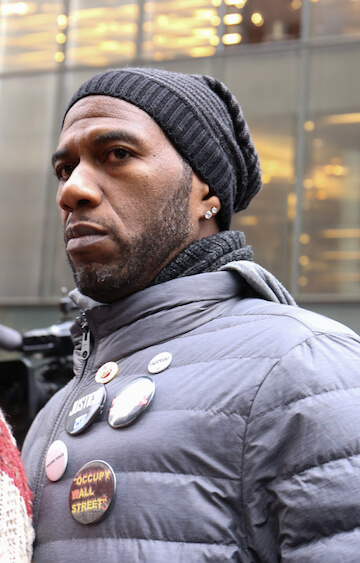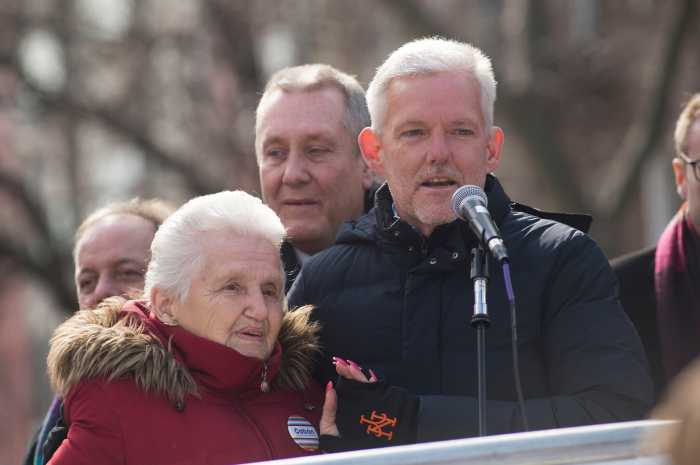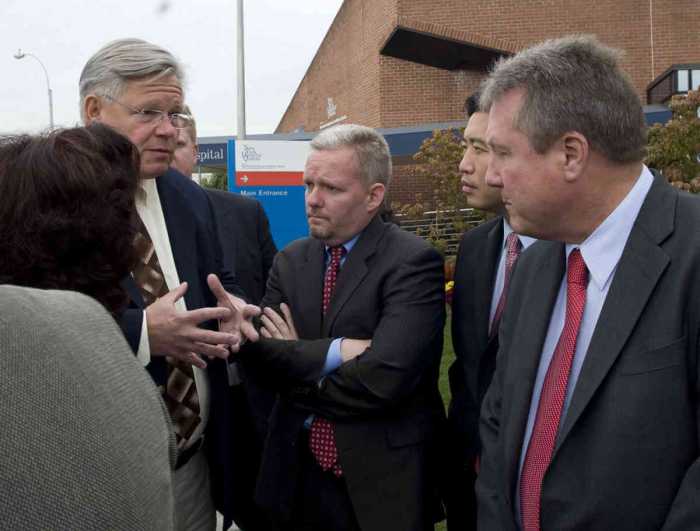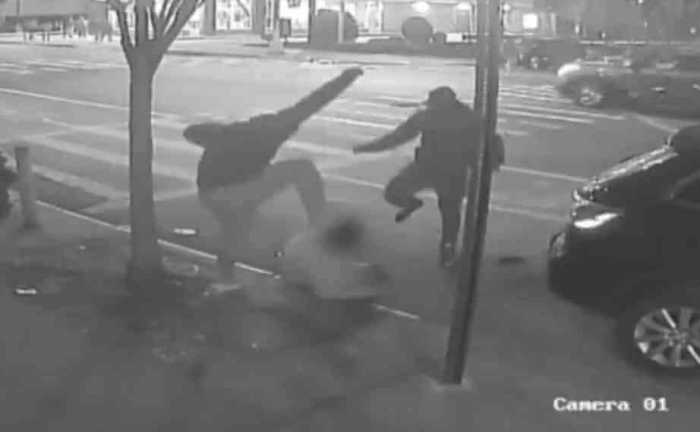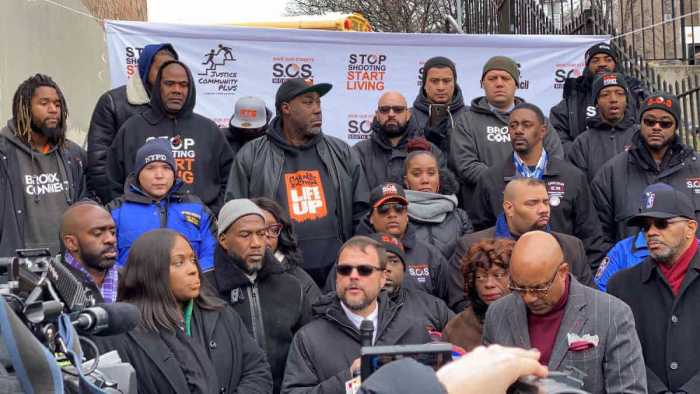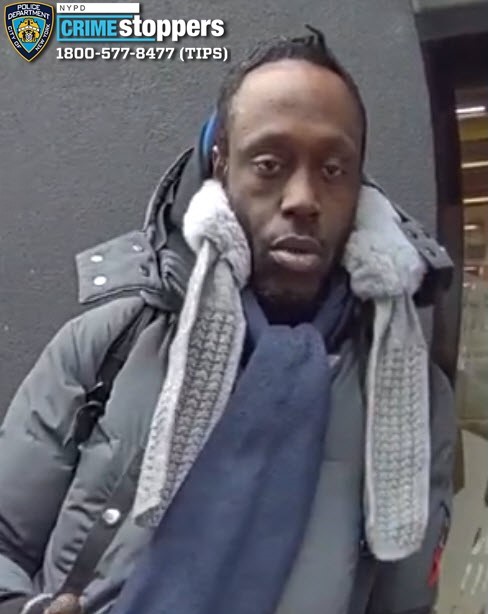City Councilmember Jumaane Williams in a “Resist From Day One” protest on January 20, the day Donald Trump was sworn in as president. | TEQUILA MINSKY
“I support marriage equality. I will fight to protect marriage equality,” Brooklyn City Councilmember Jumaane Williams told Gay City News at the start of a 30-minute sit-down on October 19 that his office requested. Williams, a 41-year-old son of immigrants from Grenada, represents a broad swath of the city’s Caribbean community in a district centered on Flatbush and East Flatbush. With term limits facing Council Speaker Melissa Mark-Viverito, he is mounting his second bid to win that post in a contest due to be decided between Election Day and the first of the year.
Williams’ ambitions on that score explain why — six years after marriage equality became law in New York and two years after the Supreme Court settled the issue nationwide — an outspokenly progressive Council leader was reciting what has long been an article of faith among so many other local politicians.
Same-sex marriage and a woman’s right to choose are issues on which Williams has at times found himself tongue-tied, and the view he was not there on either question hurt him badly when he threw his hat in the ring for speaker four years ago.
Jumaane Williams offers straight talk on gay marriage, abortion rights
As the Council’s Progressive Caucus prepared to meet in late November of 2013 to discuss that race, out lesbian Lower East Side Councilmember Rosie Mendez told Capital New York that Williams would have to “affirmatively come out and say that he supports gay marriage and he supports a woman’s right to choose for me to consider him.” Christine Quinn, another out lesbian finishing up eight years as speaker, quoted in the Daily News, similarly dismissed candidates who weren’t “pro-LGBT or pro-choice.” Quinn did not name Williams, but he was widely seen as her target.
At the time, Williams spoke about these issues largely in frustration that he was being asked to boil down complex issues into approved soundbites. In contrast, last week he spoke directly and in strikingly personal terms.
“I support marriage equality, and this is helpful to what I think people deserve to hear,” he said. His past difficulties explaining himself, he said, were based in part on religious beliefs he learned as a youth but also on what he conceded was his “muddled” message.
“I think when you’re brought up, your religion tells you a whole lot of stuff,” he said. “A lot of it is very good. I use a lot of it for the work I do, the revolutionary aspect of it. Jesus of Nazareth… a revolutionary fighting for people who are oppressed, fighting to make sure that people had their voice. So that gives me my push for equality and equity. But religion can be used for some very bad things, for slavery, for homophobia, for a lot of craziness.”
Faith is clearly important in Williams’ life. Twice referring to his late father, he reflexively said “rest his soul,” and in explaining the bond he feels with out gay Councilmember Daniel Dromm of Queens, he recalled watching an old video of Dromm giving an address in which he reminded LGBTQ youth, “God loves us.”
“The mindset that you have to say that is crazy,” Williams said. “You have to reaffirm that God loves you. That really hit me. Damn.”
The unhealthy mix of politics and religion regarding marriage equality first began to trouble him when he learned his father, a pastor who divorced his mother and later started another family, was voting for George W. Bush “solely” because he felt gays marrying would lead to “the destruction of family life.”
“As you try to figure it out, you have to evolve because some of the good things you learn don’t really match up,” Williams explained. “If everybody’s equal, everybody’s God’s child, some of these things they’re saying don’t really make sense.”
The stakes, he added, are all that much greater in the age of Trump, which has “crystallized” that “if you’re hating here, that’s all bleeding across” society as a whole.
Williams is also taking steps to make clear his support for “a woman’s right to have access to safe and legal abortion,” recently introducing legislation barring employers from discriminating against any worker based on their reproductive health care decisions. “I was trying to be very clear that without those protections, it’s going to be dangerous for women,” he said. “Who the hell is an employer to be able to fire someone based on a decision that someone makes about their reproductive health. That’s just so out of bounds, it’s absurd.”
In the past, Williams has talked about the grief he felt when a woman terminated a pregnancy they created together — an issue he said there “is no space for us to discuss” amidst the reproductive freedom debate. “Not that it should change what the rights of a woman are,” he now hastens to add. “And it’s clear that it is men’s privilege here. If the discussion were reversed, there wouldn’t even be a discussion.”
On other issues, Williams’ credentials as a progressive fighter have never been in doubt. In 2013, with his Brooklyn colleague Brad Lander, Williams led the fight to overcome Mayor Michael Bloomberg’s veto of two Community Safety Act measures that ended discriminatory profiling based on a variety of categories — including sexual orientation and gender identity, the biggest LGBTQ advances on the Council in a decade, he noted — and gave the city’s Department of Investigation independent oversight of the NYPD. He later co-sponsored with his out gay Brooklyn colleague Carlos Menchaca a Council resolution urging the State Legislature to bar the use of condoms as evidence in prostitution arrests, a practice Williams said was often used to harass transgender women.
Over the past four years, Williams said, police-community relations have improved — “more than there is credit for on the ground.” He added two big caveats, however: transparency has been hurt by records of NYPD internal disciplinary actions no longer being public, and accountability has not improved. “The people who murder people on camera are not only on the police force, they receive raises, they get more money, and nothing has happened, and frustrating is not the right word,” he said.
Williams is proud of his record on a different front, as well — tenant protections — as chair of the Committee on Housing and Buildings. The recent package of tenant protections enacted, he said, “used the powers that we have [on the Council] very well.” Still, he acknowledged, “I also believe that as soon as we do stuff, unscrupulous landlords change and adapt, so we have to come back.”
Tenacity and results, Williams argued, are his best qualifications for the job of speaker. “I have navigated some pretty controversial things through this Council productively and without dividing the Council and without dividing the city,” he said. “And we need that right now because we’re up against some very bad people, and the Trumpian era is one that needs someone who is not afraid to push forward.”

